Mary Kay Carson's Blog, page 4
June 3, 2019
Writing About Robert E. Lee
At Arlington House, The Robert E. Lee Memorial, Lee's home before the Civil War
by Brandon Marie Miller
I have a new YA (Young Adult) biography coming out on June 11, Robert E. Lee, The Man, The Soldier, The Myth (Calkins Creek/Boyds Mill & Kane Press). It's my first book in three years, which seems a lifetime in publishing. With Lee (and statues of Lee) so constantly in the news it's
by Brandon Marie Miller
I have a new YA (Young Adult) biography coming out on June 11, Robert E. Lee, The Man, The Soldier, The Myth (Calkins Creek/Boyds Mill & Kane Press). It's my first book in three years, which seems a lifetime in publishing. With Lee (and statues of Lee) so constantly in the news it's
Published on June 03, 2019 11:46
May 4, 2019
Why Knot Plant a Knot Garden?
With my new book MUMMIES EXPOSED! arriving on May 7, it's been a busy time . It's spring, after all, and I need to get outside to clean up after Old Man Winter and get ready to plant flowers.
I'll get you a mummy activity come fall. In the meantime, how about planting a flower-and-herb version of an Elizabethan knot garden?
Like Elizabeth Tudor, England's Queen Elizabeth I? Of course you can
I'll get you a mummy activity come fall. In the meantime, how about planting a flower-and-herb version of an Elizabethan knot garden?
Like Elizabeth Tudor, England's Queen Elizabeth I? Of course you can
Published on May 04, 2019 07:35
March 31, 2019
Is It Tornado Season Where You Live?
by Mary Kay Carson
Spring is here! It's time to leave the mittens and heavy coats behind, enjoy the budding trees and blooming flowers, and also be aware of severe weather. That's right, springtime is tornado season across much of the United States. But it depends where you live. That's one of the many things I learned while researching my newest book, The Tornado Scientist: Seeing Inside
Spring is here! It's time to leave the mittens and heavy coats behind, enjoy the budding trees and blooming flowers, and also be aware of severe weather. That's right, springtime is tornado season across much of the United States. But it depends where you live. That's one of the many things I learned while researching my newest book, The Tornado Scientist: Seeing Inside
Published on March 31, 2019 14:24
March 1, 2019
Wealthy Widow Jailed as Suffragist
We are three months out from the centennial celebration of the Nineteenth Amendment to the U.S. Constitution. With two-thirds majorities in both House and Senate, Congress proposed it on June 4, 1919. Women’s suffrage became law of the land when Tennessee ratified on August 8, 1920. There was plenty of drama, too. In February 1919, suffragists who’d been jailed boarded the “Prison Special” to
Published on March 01, 2019 15:06
February 1, 2019
GEORGE WASHINGTON CARVER, "THE PEANUT GUY"
By guest-blogger Peggy Thomas
<!--[if gte mso 9]>
<!--[if gte mso 9]>
Published on February 01, 2019 14:01
January 3, 2019
Camouflaged to Hide and Hunt
Buy me!
By Mary Kay Carson
Kids love to look at pictures of strange and scary, bizarre and slimy, weird and wonderful animals. Harness that fascination but challenging students to ask WHY? Why does that animal have bright red lips, a covering of goo, or legs covered in spikes? How might these strange-looking characteristics help the animal survive? Does it help it find food, hide, hunt, or
By Mary Kay Carson
Kids love to look at pictures of strange and scary, bizarre and slimy, weird and wonderful animals. Harness that fascination but challenging students to ask WHY? Why does that animal have bright red lips, a covering of goo, or legs covered in spikes? How might these strange-looking characteristics help the animal survive? Does it help it find food, hide, hunt, or
Published on January 03, 2019 09:55
November 30, 2018
Join the Ultima Journey
 By Mary Kay Carson
By Mary Kay CarsonThe spunky spacecraft that became the first visitor to Pluto in 2015 is about to make history again. New Horizons is nearing its second stop, an icy object being called Ultima Thule. Meaning a place "beyond what is known" it's the perfect nick-name for this dark reddish chunk of ice and rock a billion miles past Pluto. Ultima Thule is a Kuiper Belt object, one of millions that orbit beyond Neptune that make up our solar system's outer zone.
After accomplishing its nearly ten-year journey to the Pluto system where it rewrote the book on the icy dwarf planet and its five moons, New Horizons headed toward the small Kuiper Belt object. The speedy grand-piano-sized robotic probe will reach Ultima Thule late this month on New Year's Eve. It will be the farthest planetary exploration by a spacecraft ever! The KBO is an astounding 4 billion miles from the Sun.
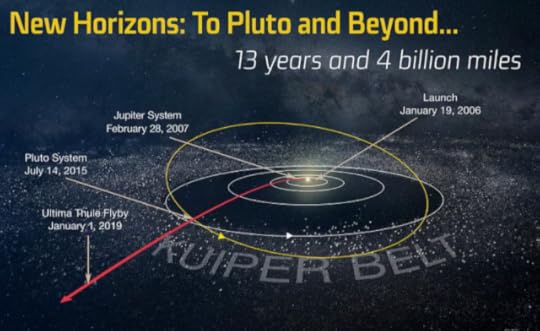
Here's how to make sure you're tuned into the action and how to get students up to speed on the mission so far, as well as some fun activities to share.
Get caught up on the story so far, by reading my book Mission to Pluto. There's a great free downloadable educator's guide for the book, too.
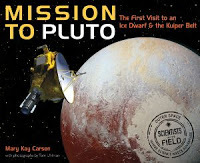 There are tons of great resources for educators on the New Horizons website, including activities for K-12, a 3D model printing file, and a fun-to-make one-twentififth scale paper model that's available as a printable PDF.(You'll need the instructions, too.)Watch these web and social media sites for more, including live links during the flyby event:
There are tons of great resources for educators on the New Horizons website, including activities for K-12, a 3D model printing file, and a fun-to-make one-twentififth scale paper model that's available as a printable PDF.(You'll need the instructions, too.)Watch these web and social media sites for more, including live links during the flyby event:Facebook www.facebook.com/new.horizons1/Twitter @NASANewHorizons #UltimaThule #UltimaFlybyNASA www.nasa.gov/mission_pages/newhorizonsNew Horizons pluto.jhuapl.eduAlso, here is an annotated activity to help students comprehend just how far away Ultima Thule is. It's from my book Exploring the Solar System . Go New Horizons, go!
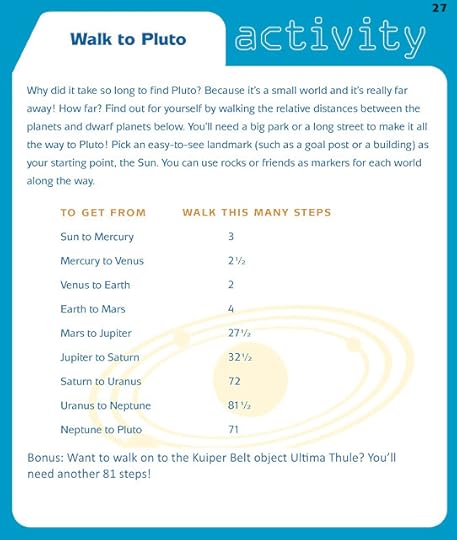
Published on November 30, 2018 12:33
November 1, 2018
FOLLOW THE TRACKS
Activity: Try Your Hand At This Ancient Skill
by Brandon Marie Miller
Humans have tracked and hunted animals for thousands of years. Prehistoric cave paintings show hunters at work finding food for their families. Most of us no longer hunt for our food. But if you want to discover the birds and animals in your own neighborhood-- get outside, open your eyes, and start tracking. You might be surprised at what you find!
 A Prehistoric cave painting of hunters using bows and arrows
A Prehistoric cave painting of hunters using bows and arrows
You are looking for "spoor." This means any tracks, signs, marks, or disturbances left by a passing animal. A track is an outline or imprint left in dirt, mud, or sand. This can be a footprint, or maybe the print of a tail dragging in the mud. Every animal has a different footprint.
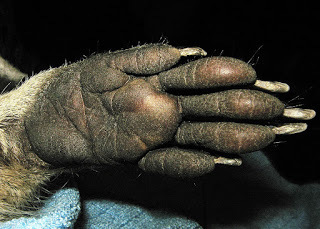 A underside of a racoon foot
A underside of a racoon foot
Look closely. Are there nibbled plants? Broken bits of nut shell? An animal has eaten a meal! Are there feathers on the ground? A piece of fur stuck of a twig? Has a tree trunk been marked by a deer rubbing its antlers or maybe there are claw marks in the wood? An animal has passed this way.
If you are in a park check for worn down paths that might be an animal trail. Are there nests, burrows and tunnels into the ground, are there dens or caves? These are animal homes.
You might even see "scat" or animal poop. Watch where you step! Did you know different animals have poop of various shapes and sizes, from little rabbit pellets to large flat patties?
You can find books at your local library and charts online that show different animal tracks. But you can get started with the activity below. Happy tracking!
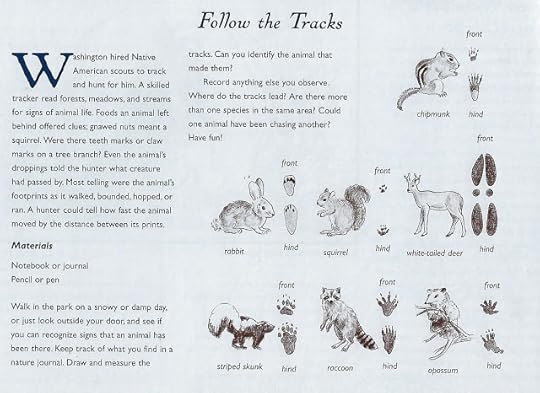
by Brandon Marie Miller
Humans have tracked and hunted animals for thousands of years. Prehistoric cave paintings show hunters at work finding food for their families. Most of us no longer hunt for our food. But if you want to discover the birds and animals in your own neighborhood-- get outside, open your eyes, and start tracking. You might be surprised at what you find!
 A Prehistoric cave painting of hunters using bows and arrows
A Prehistoric cave painting of hunters using bows and arrowsYou are looking for "spoor." This means any tracks, signs, marks, or disturbances left by a passing animal. A track is an outline or imprint left in dirt, mud, or sand. This can be a footprint, or maybe the print of a tail dragging in the mud. Every animal has a different footprint.
 A underside of a racoon foot
A underside of a racoon footLook closely. Are there nibbled plants? Broken bits of nut shell? An animal has eaten a meal! Are there feathers on the ground? A piece of fur stuck of a twig? Has a tree trunk been marked by a deer rubbing its antlers or maybe there are claw marks in the wood? An animal has passed this way.
If you are in a park check for worn down paths that might be an animal trail. Are there nests, burrows and tunnels into the ground, are there dens or caves? These are animal homes.
You might even see "scat" or animal poop. Watch where you step! Did you know different animals have poop of various shapes and sizes, from little rabbit pellets to large flat patties?
You can find books at your local library and charts online that show different animal tracks. But you can get started with the activity below. Happy tracking!

Published on November 01, 2018 08:34
September 30, 2018
Astronaut or Aquanaut—Which would you be?
by guest-blogger Jennifer Swanson
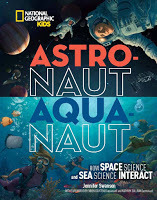 It’s so much fun to imagine what our future careers will be one day. You might find yourself wishing to blast off into space OR to dive deep under the ocean. But would you like either of these careers? Are they hard to do? What kind of training is needed? And WHAT does the suit you have to wear look and feel like? These are all amazing questions. A lot of them are answered in my book, Astronaut-Aquanaut: How Space Science and Sea Science Interact. But because this is a science/STEM/STEAM book we have some fun activities for you to do right in your own home to see which one of these careers you might choose.
It’s so much fun to imagine what our future careers will be one day. You might find yourself wishing to blast off into space OR to dive deep under the ocean. But would you like either of these careers? Are they hard to do? What kind of training is needed? And WHAT does the suit you have to wear look and feel like? These are all amazing questions. A lot of them are answered in my book, Astronaut-Aquanaut: How Space Science and Sea Science Interact. But because this is a science/STEM/STEAM book we have some fun activities for you to do right in your own home to see which one of these careers you might choose.
Astronaut Training:Do you have what it takes to dock at the Space Station? Grab a tennis ball, a big plastic cup, some rope or strong string and give it a try. It’s not as easy as you think!
Aquanaut Training:Underwater is all about how things float. If you were going to dive deep under water, how do you make sure that you stay down there? And how do you make sure that you come back up? That force is called Buoyancy. It’s a force that pushes up on us as gravity pushes down. Try this experiment to see how things float… or sink
Did you succeed? Did both of your experiments work? Which one did you like more?Challenge: If you’re looking for more ways to decide, I challenge you to design your own space suit OR underwater suit. What would it look like? What tools would it have? Draw it and compare with your friend.
So what did you decide? Will you be an Astronaut OR Aquanaut?
My choice? Aquanaut. All the way. I’d rather see this out my window: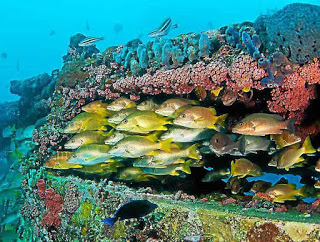
Than this:
Although to be quite honest, they are both amazing views! Thanks so much for joining me on the Hands-On Books! Jennifer Swanson, www.JenniferSwansonBooks.com
 It’s so much fun to imagine what our future careers will be one day. You might find yourself wishing to blast off into space OR to dive deep under the ocean. But would you like either of these careers? Are they hard to do? What kind of training is needed? And WHAT does the suit you have to wear look and feel like? These are all amazing questions. A lot of them are answered in my book, Astronaut-Aquanaut: How Space Science and Sea Science Interact. But because this is a science/STEM/STEAM book we have some fun activities for you to do right in your own home to see which one of these careers you might choose.
It’s so much fun to imagine what our future careers will be one day. You might find yourself wishing to blast off into space OR to dive deep under the ocean. But would you like either of these careers? Are they hard to do? What kind of training is needed? And WHAT does the suit you have to wear look and feel like? These are all amazing questions. A lot of them are answered in my book, Astronaut-Aquanaut: How Space Science and Sea Science Interact. But because this is a science/STEM/STEAM book we have some fun activities for you to do right in your own home to see which one of these careers you might choose.Astronaut Training:Do you have what it takes to dock at the Space Station? Grab a tennis ball, a big plastic cup, some rope or strong string and give it a try. It’s not as easy as you think!

Aquanaut Training:Underwater is all about how things float. If you were going to dive deep under water, how do you make sure that you stay down there? And how do you make sure that you come back up? That force is called Buoyancy. It’s a force that pushes up on us as gravity pushes down. Try this experiment to see how things float… or sink

Did you succeed? Did both of your experiments work? Which one did you like more?Challenge: If you’re looking for more ways to decide, I challenge you to design your own space suit OR underwater suit. What would it look like? What tools would it have? Draw it and compare with your friend.
So what did you decide? Will you be an Astronaut OR Aquanaut?
My choice? Aquanaut. All the way. I’d rather see this out my window:

Than this:

Although to be quite honest, they are both amazing views! Thanks so much for joining me on the Hands-On Books! Jennifer Swanson, www.JenniferSwansonBooks.com
Published on September 30, 2018 13:46
August 31, 2018
Cook Chinese Dumplings by (Chinese) Lantern Light!
We welcome author Sherry Ellis this month!
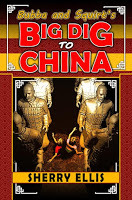 I’m happy to announce the release of my newest book,
Bubba and Squirt’s Big Dig to China
.
It's fiction based on my research about China.
I’m happy to announce the release of my newest book,
Bubba and Squirt’s Big Dig to China
.
It's fiction based on my research about China. When Bubba and Squirt accidentally arrive in China, they discover they are in a pit with the Terracotta Warriors. These statues were first discovered in 1974 by local farmers digging for a well. The warriors were buried with the first Emperor of China, Ch’in Shi Huang-ti. Their purpose was to help him rule another empire in the afterlife. It is believed that there are more than 8,000 soldiers. No two are the same.
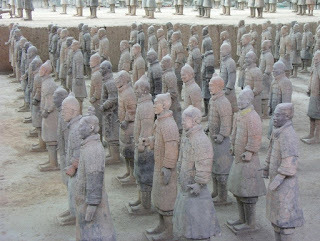 Ch’in Shi Huang-ti was a ruthless emperor, but he was an important figure in Chinese history. Some of his accomplishments included . . . . beginning construction of the Great Wall of China . standardizing Chinese units of measurements and currency . unifying Chinese script
Ch’in Shi Huang-ti was a ruthless emperor, but he was an important figure in Chinese history. Some of his accomplishments included . . . . beginning construction of the Great Wall of China . standardizing Chinese units of measurements and currency . unifying Chinese scriptThroughout my story, Bubba and Squirt experience Chinese culture. They enjoy eating Chinese dumplings, or jiaozi. You can buy them in Chinese restaurants or from grocery stores. Here’s the recipe if you would like to try making them at home.
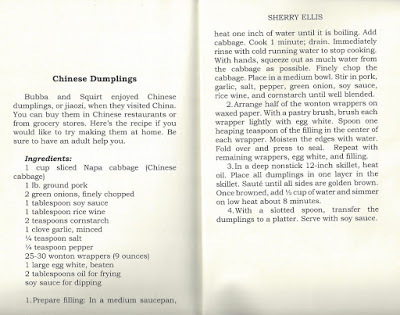
Another cool thing you can do is make Chinese paper lanterns. Here’s how:
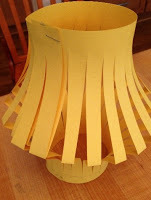
Materials:
Colored construction paperPencil and eraserRulerScissorsStapler/tapeSmall battery operated candle
What to do:1. Cut a strip of paper ½ inch wide from the short end.2. Fold the remaining paper in half lengthwise.3. With your pencil, mark a line ½ inch from the open edge.4. Mark ½ inch marks along this line.5. Cut the lines from the folded edge through both layers.6. Open paper and roll to form a cylinder.7. Tape or staple the edges at the top, middle, and bottom8. Add the handle. And the candle!
Steps in Pictures:
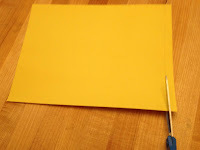 Step1
Step1
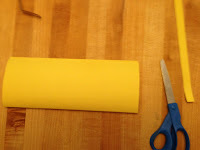 Step 2
Step 2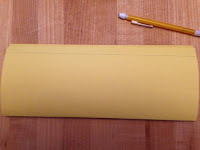 Steps 3 and 4
Steps 3 and 4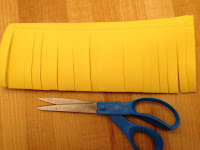 Step 5
Step 5
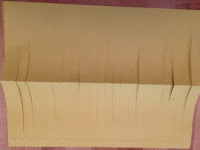 Step 6
Step 6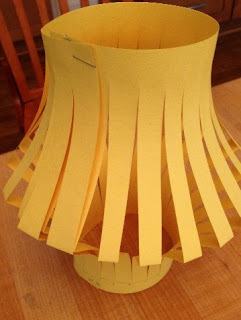 Steps 7 and 9Light your candle and enjoy those dumplings!
Steps 7 and 9Light your candle and enjoy those dumplings! Sherry Ellis is an award-winning author and professional musician who plays and teaches the violin, viola, and piano. When she is not writing or engaged in musical activities, she can be found doing household chores, hiking, or exploring the world. Ellis, her husband,and their two children live in Atlanta, Georgia.
Sherry Ellis is an award-winning author and professional musician who plays and teaches the violin, viola, and piano. When she is not writing or engaged in musical activities, she can be found doing household chores, hiking, or exploring the world. Ellis, her husband,and their two children live in Atlanta, Georgia.
Published on August 31, 2018 10:41



